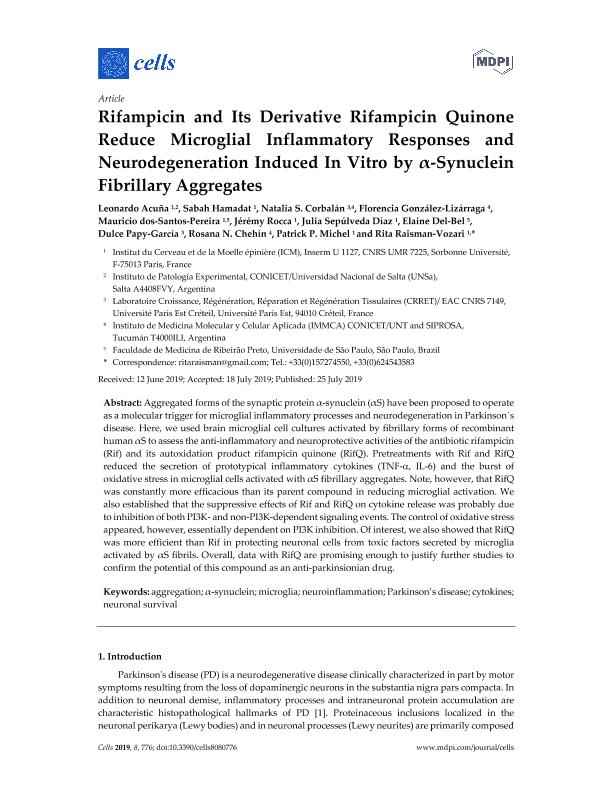Artículo
Rifampicin and Its Derivative Rifampicin Quinone Reduce Microglial Inflammatory Responses and Neurodegeneration Induced In Vitro by α-Synuclein Fibrillary Aggregates
Acuña, Leonardo ; Hamadat, Sabah; Corbalan, Natalia Soledad
; Hamadat, Sabah; Corbalan, Natalia Soledad ; González Lizarraga, Maria Florencia
; González Lizarraga, Maria Florencia ; Dos Santos Pereira, Mauricio; Rocca, Jérémy; Sepúlveda Díaz, Julia; Del Bel, Elaine; Papy García, Dulce; Chehin, Rosana Nieves
; Dos Santos Pereira, Mauricio; Rocca, Jérémy; Sepúlveda Díaz, Julia; Del Bel, Elaine; Papy García, Dulce; Chehin, Rosana Nieves ; Michel, Patrick P.; Raisman Vozari, Rita
; Michel, Patrick P.; Raisman Vozari, Rita
 ; Hamadat, Sabah; Corbalan, Natalia Soledad
; Hamadat, Sabah; Corbalan, Natalia Soledad ; González Lizarraga, Maria Florencia
; González Lizarraga, Maria Florencia ; Dos Santos Pereira, Mauricio; Rocca, Jérémy; Sepúlveda Díaz, Julia; Del Bel, Elaine; Papy García, Dulce; Chehin, Rosana Nieves
; Dos Santos Pereira, Mauricio; Rocca, Jérémy; Sepúlveda Díaz, Julia; Del Bel, Elaine; Papy García, Dulce; Chehin, Rosana Nieves ; Michel, Patrick P.; Raisman Vozari, Rita
; Michel, Patrick P.; Raisman Vozari, Rita
Fecha de publicación:
2019
Editorial:
Multidisciplinary Digital Publishing Institute
Revista:
Cells
e-ISSN:
2073-4409
Idioma:
Inglés
Tipo de recurso:
Artículo publicado
Clasificación temática:
Resumen
Abstract: Aggregated forms of the synaptic protein α‐synuclein (αS) have been proposed to operateas a molecular trigger for microglial inflammatory processes and neurodegeneration in Parkinson´sdisease. Here, we used brain microglial cell cultures activated by fibrillary forms of recombinanthuman αS to assess the anti‐inflammatory and neuroprotective activities of the antibiotic rifampicin(Rif) and its autoxidation product rifampicin quinone (RifQ). Pretreatments with Rif and RifQreduced the secretion of prototypical inflammatory cytokines (TNF‐, IL‐6) and the burst ofoxidative stress in microglial cells activated with αS fibrillary aggregates. Note, however, that RifQwas constantly more efficacious than its parent compound in reducing microglial activation. Wealso established that the suppressive effects of Rif and RifQ on cytokine release was probably dueto inhibition of both PI3K‐ and non‐PI3K‐dependent signaling events. The control of oxidative stressappeared, however, essentially dependent on PI3K inhibition. Of interest, we also showed that RifQwas more efficient than Rif in protecting neuronal cells from toxic factors secreted by microgliaactivated by αS fibrils. Overall, data with RifQ are promising enough to justify further studies toconfirm the potential of this compound as an anti‐parkinsionian drug.
Archivos asociados
Licencia
Identificadores
Colecciones
Articulos(INIQUI)
Articulos de INST.DE INVEST.PARA LA INDUSTRIA QUIMICA (I)
Articulos de INST.DE INVEST.PARA LA INDUSTRIA QUIMICA (I)
Citación
Acuña, Leonardo; Hamadat, Sabah; Corbalan, Natalia Soledad; González Lizarraga, Maria Florencia; Dos Santos Pereira, Mauricio; et al.; Rifampicin and Its Derivative Rifampicin Quinone Reduce Microglial Inflammatory Responses and Neurodegeneration Induced In Vitro by α-Synuclein Fibrillary Aggregates; Multidisciplinary Digital Publishing Institute; Cells; 8; 8; 2019; 1-17
Compartir
Altmétricas



